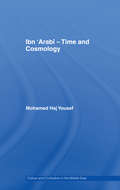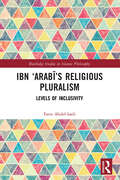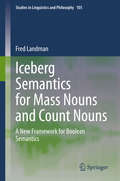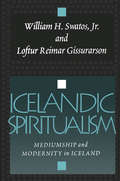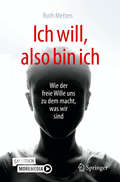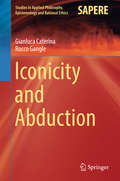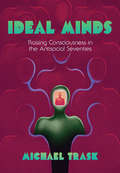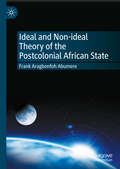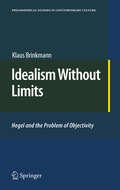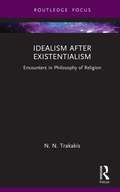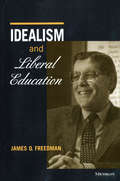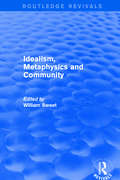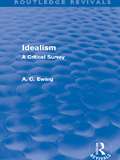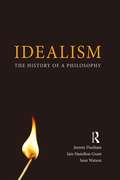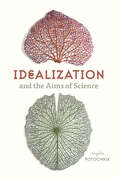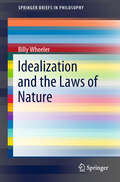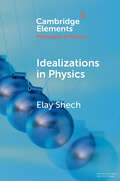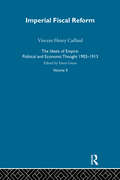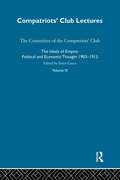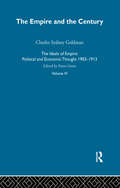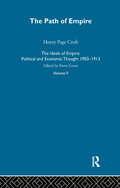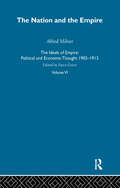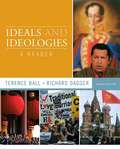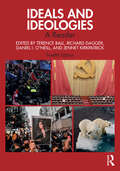- Table View
- List View
Ibn ‘Arabî - Time and Cosmology (Culture and Civilization in the Middle East)
by Mohamed Haj YousefThis book is the first comprehensive attempt to explain Ibn ‘Arabî’s distinctive view of time and its role in the process of creating the cosmos and its relation with the Creator. By comparing this original view with modern theories of physics and cosmology, Mohamed Haj Yousef constructs a new cosmological model that may deepen and extend our understanding of the world, while potentially solving some of the drawbacks in the current models such as the historical Zeno's paradoxes of motion and the recent Einstein-Podolsky-Rosen paradox (EPR) that underlines the discrepancies between Quantum Mechanics and Relativity.
Ibn ‘Arabī’s Religious Pluralism: Levels of Inclusivity (Routledge Studies in Islamic Philosophy)
by Faris Abdel-hadiThis book marks a significant contribution to the debate around Ibn ʿArabī’s religious pluralism, focusing on his multifaceted approach to non-Abrahamic religions.For nearly eight hundred years, the writings and ideas of the great Spanish Sufi master Ibn ʿArabī have shaped Islamic intellectual and spiritual culture, from North and West Africa and France on the one hand, to Iran, the Levant, Central Asia, and the Far East on the other. Modern scholarship on the “Greatest Master” is consequently at an all-time high. This book weighs in on a well-known aspect of his religious worldview, namely his perspective on religious pluralism, but does so from an entirely different angle. Offering a very close reading of his major works, newly translated by the author, and paying particular attention to a highly developed celestial metaphor prompted by his encounter with a group of pagan sun-worshippers, the book offers new insights into the nature and scope of Ibn ʿArabī’s understanding of Islamic inclusivism. Ultimately, the book contributes to our understanding of both interfaith dialogue and the history of world religions through the prism of Ibn ʿArabī’s work.The book will be of particular interest to students and scholars working in a range of fields, including Islamic philosophy, Sufism, and intellectual history.
Iceberg Semantics for Mass Nouns and Count Nouns: A New Framework for Boolean Semantics (Studies in Linguistics and Philosophy #105)
by Fred LandmanIceberg semantics is a new framework of Boolean semantics for mass nouns and count nouns in which the interpretation of a noun phrase rises up from a generating base and floats with its base on its Boolean part set, like an iceberg. The framework is shown to preserve the attractive features of classical Boolean semantics for count nouns; the book argues that Iceberg semantics forms a much better framework for studying mass nouns than the classical theory does. Iceberg semantics uses its notion of base to develop a semantic theory of the differences between mass nouns and count nouns and between different types of mass nouns, in particular between prototypical mass nouns (here called mess mass nouns) like water and mud versus object mass nouns (here called neat mass nouns) like poultry and pottery. The book shows in detail how and why neat mass nouns pattern semantically both with mess mass nouns and with count nouns. Iceberg semantics is a compositional theory and in Iceberg semantics the semantic distinctions defined apply to noun phrases of any complexity. The book studies in depth the semantics of classifier noun phrases (like three glasses of wine) and measure noun phrases (like three liters of wine). The classical wisdom is that classifier interpretations are count. Recent literature has argued compellingly that measure interpretations are mass. The book shows that both connections follow from the basic architecture of Iceberg semantics.Audience: Scholars and students in linguistics - in particular semantics, pragmatics, computational linguistics and syntax – and neighbouring disciplines like logic, philosophy of language, and cognitive science.
Icelandic Spiritualism: Mediumship and Modernity in Iceland
by Loftur Reimar GissurarsonIcelandic Spiritualism is an engaging social anthropological study of the place of spiritualism in Icelandic church and society during the first half of the twentieth century. Challenging standard theoretical approaches to the study of religion, the book contributes a wealth of data on the history of religion and psychical research, presenting it in a vivid descriptive narrative.The authors trace the role of the spirit world in Icelandic culture, giving particular attention to the distinctive history of Iceland's "conversion" to Christianity. They focus on the appearance of "modern" spiritualism as a distinct phenomenon in Icelandic life. The book studies the interaction between various groups in fin-de-siecle Icelandic society, not least in the state church, as mediumistic phenomena became widely reported through the newspapers.To some, Icelandic spiritualism may be considered a deviant case of Protestantism. What makes this book interesting, however, is that the spiritualism is seen as integral to Iceland's transition to modernity. While Icelandic Spiritualism concentrates mainly on the first half of the twentieth century, it also provides a summary of the continuation of spiritualist phenomena up to the current period. This intriguing study will be of interest to theologians, philosophers, sociologists, psychologists, and anthropologists.
Ich will, also bin ich: Wie der freie Wille uns zu dem macht, was wir sind
by Ruth MettenDieses Buch appelliert an Sie, Ihren freien Willen zu gebrauchen. Denn allen wissenschaftlichen Unkenrufen zum Trotz: wir haben – wie gezeigt wird – tatsächlich einen freien Willen; wir haben einen Zugriff auf unsere Freiheit. Das ist sogar von allerhöchster Bedeutung: denn unser Selbst scheint erst durch Willensakte zustande zu kommen. Verhält es sich aber so, dann täten wir gut daran, unseren Willen zu bilden, wie es die alten Meditationsschulen empfehlen. Und wodurch gelingt das? Indem wir uns in Achtsamkeit und Selbsthypnose üben, wozu der letzte Teil des Buches anleiten will. Mit einem Geleitwort von Dr. Burkhard Peter. Aus dem Inhalt: Der freie Wille – eine Illusion? – Leben gedeiht in Freiheit – Rückschläge – Mit vielen Beispielen, Übungen und Aha-Momenten. Mit Hörübungen zum Download. Über die Autorin: Dr. med. Ruth Metten ist als Fachärztin für Psychiatrie und Psychotherapie in Kempen niedergelassen, beschäftigt sich mit Sterbebegleitung, Achtsamkeit und Selbsthypnose und hält zum Thema dieses Buches Vorträge und Seminare.
Iconicity and Abduction
by Rocco Gangle Gianluca CaterinaThis book consolidates and extends the authors work on the connection between iconicity and abductive inference. It emphasizes a pragmatic, experimental and fallibilist view of knowledge without sacrificing formal rigor. Within this context, the book focuses particularly on scientific knowledge and its prevalent use of mathematics. To find an answer to the question What kind of experimental activity is the scientific employment of mathematics? the book addresses the problems involved in formalizing abductive cognition. For this, it implements the concept and method of iconicity, modeling this theoretical framework mathematically through category theory and topoi. Peirce's concept of iconic signs is treated in depth, and it is shown how Peirce's diagrammatic logical notation of Existential Graphs makes use of iconicity and how important features of this iconicity are representable within category theory. Alain Badiou s set-theoretical model of truth procedures and his relational sheaf-based theory of phenomenology are then integrated within the Peircean logical context. Finally, the book opens the path towards a more naturalist interpretation of the abductive models developed in Peirce and Badiou through an analysis of several recent attempts to reformulate quantum mechanics with categorical methods. Overall, the book offers a comprehensive and rigorous overview of past approaches to iconic semiotics and abduction, and it encompasses new extensions of these methods towards an innovative naturalist interpretation of abductive reasoning. "
Ideal Minds: Raising Consciousness in the Antisocial Seventies
by Michael TraskFollowing the 1960s, that decade's focus on consciousness-raising transformed into an array of intellectual projects far afield of movement politics. The mind's powers came to preoccupy a range of thinkers and writers: ethicists pursuing contractual theories of justice, radical ecologists interested in the paleolithic brain, seventies cultists, and the devout of both evangelical and New Age persuasions. In Ideal Minds, Michael Trask presents a boldly revisionist argument about the revival of subjectivity in postmodern American culture, connecting familiar figures within the seventies intellectual landscape who share a commitment to what he calls "neo-idealism" as a weapon in the struggle against discredited materialist and behaviorist worldviews.In a heterodox intellectual and literary history of the 1970s, Ideal Minds mixes ideas from cognitive science, philosophy of mind, moral philosophy, deep ecology, political theory, science fiction, neoclassical economics, and the sociology of religion. Trask also delves into the decade's more esoteric branches of learning, including Scientology, anarchist theory, rapture prophesies, psychic channeling, and neo-Malthusianism. Through this investigation, Trask argues that a dramatic inflation in the value of consciousness and autonomy beginning in the 1970s accompanied a growing argument about the state's inability to safeguard such values. Ultimately, the thinkers Trask analyzes—John Rawls, Arne Naess, L. Ron Hubbard, Hal Lindsey, Philip Dick, Ursula Le Guin, Edward Abbey, William Burroughs, John Irving, and James Merrill—found alternatives to statism in conditions that would lend intellectual support to the consolidation of these concepts in the radical free market ideologies of the 1980s.
Ideal and Non-ideal Theory of the Postcolonial African State
by Frank Aragbonfoh AbumereThe fundamental question asked in this book is: what is the basic structure of the postcolonial African state? Taking the postcolonial African state as it is and as it ought to be, Frank Abumere defines the basic structure of the postcolonial African state as how the scope and contents of the rights and obligations that govern the vertical and horizontal relationships within the postcolonial African state are determined. In his conception of the basic structure of the postcolonial African state, on the one hand, vertical relationship is the relationship between the state and its citizens and residents, what the state owes to its citizens and residents, and what they owe to the state. On the other hand, horizontal relationships are the relationships among citizens (and residents) and what they owe to one another.
Idealism Without Limits
by Klaus BrinkmannIn this study of Hegel's philosophy, Brinkmann undertakes to defend Hegel's claim to objective knowledge by bringing out the transcendental strategy underlying Hegel's argument in the Phenomenology of Spirit and the Logic. Hegel's metaphysical commitments are shown to become moot through this transcendental reading. Starting with a survey of current debates about the possibility of objective knowledge, the book next turns to the original formulation of the transcendental argument in favor of a priori knowledge in Kant's First Critique. Through a close reading of Kant's Transcendental Deduction and Hegel's critique of it, Brinkmann tries to show that Hegel develops an immanent critique of Kant's position that informs his reformulation of the transcendental project in the Introduction to the Phenomenology of Spirit and the formulation of the position of 'objective thought' in the Science of Logic and the Encyclopedia of the Philosophical Sciences. Brinkmann takes the reader through the strategic junctures of the argument of the Phenomenology that establishes the position of objective thinking with which the Logic begins. A critical examination of the Introduction to the Lectures on the History of Philosophy shows that Hegel's metaphysical doctrine of the self-externalization of spirit need not compromise the ontological project of the Logic and thus does not burden the position of objective thought with pre-critical metaphysical claims. Brinkmann's book is a remarkable achievement. He has given us what may be the definitive version of the transcendental, categorial interpretation of Hegel. He does this in a clear approachable style punctuated with a dry wit, and he fearlessly takes on the arguments and texts that are the most problematic for this interpretation. Throughout the book, he situates Hegel firmly in his own context and that of contemporary discussion." -Terry P. Pinkard, University Professor, Georgetown University, Washington, D.C, USA "Klaus Brinkmann's important Hegel study reads the Phenomenology and the Logic as aspects of a single sustained effort, in turning from categories to concepts, to carry Kant's Copernican turn beyond the critical philosophy in what constitutes a major challenge to contemporary Cartesianism." - Tom Rockmore, McAnulty College Distinguished Professor, Duquesne University, Pittsburgh, Pennsylvania, USA "In this compelling reconstruction of the theme of objective thought, Klaus Brinkmann takes the reader through Hegel's dialectic with exceptional philosophical acumen.... Many aspects of this book are striking: the complete mastery of the central tenets of Kant's and Hegel's philosophy, the admirable clarity in treating obscure texts and very difficult problems, and how Brinkmann uses his expertise for a discussion of the problems of truth, objectivity and normativity relevant to the contemporary philosophical debate. This will prove to be a very important book, one that every serious student of Kant and Hegel will have to read." - Alfredo Ferrarin, Professor, Department of Philosophy, University of Pisa, Pisa, Italy
Idealism after Existentialism: Encounters in Philosophy of Religion (Routledge Focus on Philosophy)
by N. N. TrakakisA century ago the dominant philosophical outlook was not some form of materialism or naturalism, but idealism. However, this way of thinking about reality fell out of favour in the Anglo-American analytic tradition as well as the Continental schools of the twentieth century. The aim of this book is to restage and reassess the encounter between idealism and contemporary philosophy. The idealist side will be represented by the great figures of the 19th-century post-Kantian tradition in Germany, from Fichte and Schelling to Hegel, followed by the towering Hegelians in Britain led by T. H. Green, F. H. Bradley and Bernard Bosanquet. Their twentieth-century adversaries will be represented by the secular existentialists, especially the famous French trio of Sartre, Beauvoir and Camus, who sought to follow Nietzsche in philosophizing in light of the death of God. And the arena of encounter will be the philosophy of religion—more specifically, questions relating to the nature and existence of God, death and the meaning of life, and the problem of evil. The book argues that the existentialist critique of idealism enables an innovative as well as a more critical and adventurous approach that is sorely needed in philosophy of religion today. Idealism after Existentialism will be of interest to scholars and advanced students working in the history of ninteenth- and twentieth-century philosophy and philosophy of religion.
Idealism after Existentialism: Encounters in Philosophy of Religion (Routledge Focus on Philosophy)
by N. N. TrakakisA century ago the dominant philosophical outlook was not some form of materialism or naturalism, but idealism. However, this way of thinking about reality fell out of favour in the Anglo-American analytic tradition as well as the Continental schools of the twentieth century.The aim of this book is to restage and reassess the encounter between idealism and contemporary philosophy. The idealist side will be represented by the great figures of the 19th-century post-Kantian tradition in Germany, from Fichte and Schelling to Hegel, followed by the towering Hegelians in Britain led by T. H. Green, F. H. Bradley and Bernard Bosanquet. Their twentieth-century adversaries will be represented by the secular existentialists, especially the famous French trio of Sartre, Beauvoir and Camus, who sought to follow Nietzsche in philosophizing in light of the death of God. And the arena of encounter will be the philosophy of religion—more specifically, questions relating to the nature and existence of God, death and the meaning of life, and the problem of evil. The book argues that the existentialist critique of idealism enables an innovative as well as a more critical and adventurous approach that is sorely needed in philosophy of religion today.Idealism after Existentialism will be of interest to scholars and advanced students working in the history of ninteenth- and twentieth-century philosophy and philosophy of religion.
Idealism and Liberal Education
by James O. FreedmanWith refreshing eloquence, James O. Freedman sets down the American ideals that have informed his life as an intellectual, a law professor, and a college and university president. He examines the content and character of liberal education, discusses the importance of letters and learning in forming his own life and values, and explores how the lessons and the habits of mind instilled by a liberal education can give direction and meaning to one's life. He offers a stirring defense of affirmative action in higher education. And he describes how, in the midst of undergoing chemotherapy for cancer, liberal education helped him in that most human of desires--the yearning to make order and sense out of his experience. Part intellectual biography and part examination of the world of higher education, Idealism and Liberal Education is a quintessentially American book, animated by a confidence that reason, knowledge, idealism, and the better angels of our natures will further human progress. Freedman offers, as models for shaping one's life, profiles of some of his heroes--Thurgood Marshall, Alexander M. Bickel, Václav Havel, Louis D. Brandeis, Felix Frankfurter, Hugo L. Black, Flannery O'Connor, Eudora Welty, George Orwell, Edmund Wilson, Martin Luther King, Jr., George F. Kennan, Ralph J. Bunche, and Harry S Truman. This volume speaks to all Americans who are drawn to the power of liberal education and democratic citizenship and who yearn for the inspiration to lead thoughtful, committed lives.
Idealism, Metaphysics and Community (Routledge Revivals)
by William SweetThis title was first published in 2001. Idealism, Metaphysics and Community examines the place of idealism in contemporary philosophy, and its relation to problems of metaphysics, political thought, and the study of the history of philosophy. Following an extensive introduction by the editor, and drawing on the work of the Canadian idealist, Leslie Armour, the book is divided into three main parts: Part 1 focuses on F.H.Bradley; Part 2 examines metaphysical issues and idealism, such as the realism/anti-realism debate, the relation of classical and idealist metaphysics, rational psychology, time and eternity, and the divine; Part 3 draws on idealism to address contemporary concerns in ethical theory, political philosophy, social philosophy and culture and the history of philosophy. Presenting new insights into the work of classical and contemporary authors, this book provides a better understanding of classical idealism and addresses important areas of contemporary philosophical, social and political concern.
Idealism: A Critical Survey (Routledge Revivals)
by Alfred C EwingFirst published in 1934, this book evaluates the characteristic doctrines of the idealism which dominated philosophy during the last century. It seeks to combine realism, as to epistemology and physical objects, with a greater appreciation of views which emphasize the unity and rationality of the universe. This work is not a history and does not try to compete with any histories of idealism but it instead reaches an independent conclusion on certain philosophical problems by criticising what others have said. The book considers differing arguments in order to determine their validity.
Idealism: The History of a Philosophy
by Jeremy Dunham Iain Hamilton Grant Sean WatsonIdealism is philosophy on a grand scale, combining micro and macroscopic problems into systematic accounts of everything from the nature of the universe to the particulars of human feeling. In consequence, it offers perspectives on everything from the natural to the social sciences, from ecology to critical theory. Heavily criticised by the dominant philosophies of the 20th Century, Idealism is now being reconsidered as a rich and untapped resource for contemporary philosophical arguments and concepts. This volume provides a comprehensive portrait of the major arguments and philosophers in the Idealist tradition. The book demonstrates how Idealist philosophy provides a fruitful way of understanding contemporary issues in metaphysics, the philosophy of science, political philosophy, scientific theory and critical social theory.
Idealization and the Aims of Science
by Angela PotochnikScience is the study of our world, as it is in its messy reality. Nonetheless, science requires idealization to function—if we are to attempt to understand the world, we have to find ways to reduce its complexity. Idealization and the Aims of Science shows just how crucial idealization is to science and why it matters. Beginning with the acknowledgment of our status as limited human agents trying to make sense of an exceedingly complex world, Angela Potochnik moves on to explain how science aims to depict and make use of causal patterns—a project that makes essential use of idealization. She offers case studies from a number of branches of science to demonstrate the ubiquity of idealization, shows how causal patterns are used to develop scientific explanations, and describes how the necessarily imperfect connection between science and truth leads to researchers’ values influencing their findings. The resulting book is a tour de force, a synthesis of the study of idealization that also offers countless new insights and avenues for future exploration.
Idealization and the Laws of Nature (SpringerBriefs in Philosophy)
by Billy WheelerThis new study provides a refreshing look at the issue of exceptions and shows that much of the problem stems from a failure to recognize at least two kinds of exception-ridden law: ceteris paribus laws and ideal laws. Billy Wheeler offers the first book-length discussion of ideal laws. The key difference between these two kinds of laws concerns the nature of the conditions that need to be satisfied and their epistemological role in the law’s formulation and discovery. He presents a Humean-inspired approach that draws heavily on concepts from the information and computing sciences. Specifically, Wheeler argues that laws are best seen as algorithms for compressing empirical data and that ideal laws are needed as 'lossy compressors' for complex data.Major figures in the metaphysics of science receive special attention such as Ronald Giere, Bas van Fraassen, Nancy Cartwright, David Lewis and Marc Lange. This book is essential reading for philosophers of science and will interest metaphysicians, epistemologists and others interested in applying concepts from computing to traditional philosophical problems.
Idealizations in Physics (Elements in the Philosophy of Physics)
by Elay ShechThis Element offers an opinionated and selective introduction to philosophical issues concerning idealizations in physics, including the concept of and reasons for introducing idealization, abstraction, and approximation, possible taxonomy and justification, and application to issues of mathematical Platonism, scientific realism, and scientific understanding.
Ideals Of Empire V2: Political and Economic Thought 1903-1913
by Oakie WilliamsFirst published in 2004. This 6 volume set focuses on the influential economic and political commentators who saw weaknesses in the infrastructure of the British Empire at the turn of the twentieth century. Dubbed Idealists of Empire, they saw that the British Empire seemed to have no governing principles, no structure and no guiding ideals. Sir John Seeley's famous quote of 1883 sums up this view: 'we seem to have conquered and peopled half the world in a fit of absence of mind'. The mission of the idealists was to find an Imperial solution to this problem. The idealists of Empire documented their findings as they looked more systematically at the Empire's external challenges and internal workings, in terms of politics, economics and strategy. The texts published in this collection represent their most important contributions to the early twentieth-century debate on the fate of the Empire. Volume 2 includes ‘Imperial Fiscal Reform (1903)’.
Ideals Of Empire V3: Political and Economic Thought 1903-1913
by Valery E. ForbesFirst published in 2004. This 6 volume set focuses on the influential economic and political commentators who saw weaknesses in the infrastructure of the British Empire at the turn of the twentieth century. Dubbed Idealists of Empire, they saw that the British Empire seemed to have no governing principles, no structure and no guiding ideals. Sir John Seeley's famous quote of 1883 sums up this view: 'we seem to have conquered and peopled half the world in a fit of absence of mind'. The mission of the idealists was to find an Imperial solution to this problem. The idealists of Empire documented their findings as they looked more systematically at the Empire's external challenges and internal workings, in terms of politics, economics and strategy. The texts published in this collection represent their most important contributions to the early twentieth-century debate on the fate of the Empire. Volume 3 includes ‘Compatriots' Club Lectures (1905)’.
Ideals Of Empire V4: Political and Economic Thought 1903-1913
by Charles Sydney Goldman and Ewen GreenFirst published in 2004. This 6 volume set focuses on the influential economic and political commentators who saw weaknesses in the infrastructure of the British Empire at the turn of the twentieth century. Dubbed Idealists of Empire, they saw that the British Empire seemed to have no governing principles, no structure and no guiding ideals. Sir John Seeley's famous quote of 1883 sums up this view: 'we seem to have conquered and peopled half the world in a fit of absence of mind'. The mission of the idealists was to find an Imperial solution to this problem. The idealists of Empire documented their findings as they looked more systematically at the Empire's external challenges and internal workings, in terms of politics, economics and strategy. The texts published in this collection represent their most important contributions to the early twentieth-century debate on the fate of the Empire. Volume 4 includes The Empire and the Century ( 1905).
Ideals Of Empire V5: Political and Economic Thought 1903-1913
by Henry Page CroftFirst published in 2004. This 6 volume set focuses on the influential economic and political commentators who saw weaknesses in the infrastructure of the British Empire at the turn of the twentieth century. Dubbed Idealists of Empire, they saw that the British Empire seemed to have no governing principles, no structure and no guiding ideals. Sir John Seeley's famous quote of 1883 sums up this view: 'we seem to have conquered and peopled half the world in a fit of absence of mind'. The mission of the idealists was to find an Imperial solution to this problem. The idealists of Empire documented their findings as they looked more systematically at the Empire's external challenges and internal workings, in terms of politics, economics and strategy. The texts published in this collection represent their most important contributions to the early twentieth-century debate on the fate of the Empire. Volume 5 includes The Path of Empire (1912).
Ideals Of Empire V6: Political and Economic Thought 1903-1913
by Alfred MilnerFirst published in 2004. This 6 volume set focuses on the influential economic and political commentators who saw weaknesses in the infrastructure of the British Empire at the turn of the twentieth century. Dubbed Idealists of Empire, they saw that the British Empire seemed to have no governing principles, no structure and no guiding ideals. Sir John Seeley's famous quote of 1883 sums up this view: 'we seem to have conquered and peopled half the world in a fit of absence of mind'. The mission of the idealists was to find an Imperial solution to this problem. The idealists of Empire documented their findings as they looked more systematically at the Empire's external challenges and internal workings, in terms of politics, economics and strategy. The texts published in this collection represent their most important contributions to the early twentieth-century debate on the fate of the Empire. Volume 6 includes The Nation and the Empire (1913).
Ideals and Ideologies: A Reader
by Terence Ball Richard DaggerA comprehensive compilation of original readings representing all of the major 'isms, Ideals and Ideologies puts students in touch with the thinkers and ideas that shape the political world.' This reader offers students a generous sampling of key thinkers in different ideological traditions and places them in historical and political context. Used on its own or with Political Ideologies and the Democratic Ideal, Ideals and Ideologies accounts for the different ways people use ideology to interpret change in the world and directly conveys the ongoing importance of ideas in politics.
Ideals and Ideologies: A Reader
by Terence Ball, Richard Dagger, Daniel I. O’Neill, and Jennet KirkpatrickIdeals and Ideologies: A Reader is a comprehensive compilation of classic and contemporary readings representing all major “isms.” It offers students a generous sampling of key thinkers in different ideological traditions and places them in their historical and political contexts. Used on its own or with Political Ideologies and the Democratic Ideal, the anthology accounts for the different ways people use ideology and conveys the continuing importance of ideas to politics.New to this editionThe twelfth edition includes the following additions: Steven Levitsky and Daniel Ziblatt, “How Democracies Die” (two distinguished political scientists delineate the sources of democratic demise). Ayn Rand, “Collectivized Ethics” (a well-known libertarian thinker argues that it is illegitimate for governments to legally mandate behavior that benefits other people). Patrick Deneen, “Aristopopulism” (an influential conservative professor makes the case for a new kind of governing alliance between masses and elites). Herbert Marcuse, “One-Dimensional Man” (a renowned twentieth-century Marxist argues that capitalism creates a set of false needs and beliefs that prevent workers from resisting it). “Patriot Front Manifesto” (an Alt-Right white nationalist group attempts to link their ideology to American history and values). Ta-Nehisi Coates, “The Case for Reparations” (a prominent author argues that Americans should seriously consider what it would take to make amends to Black people for the ongoing effects of slavery, Jim Crow, and other forms of discrimination). Kate Manne, “Ameliorating Misogyny” (a contemporary feminist philosopher redefines misogyny as the central mechanism for governing women’s behavior and upholding patriarchy). Lorna Bracewell, “A Story of Queer Survival” (a lesbian feminist scholar links her personal coming-of-age experiences to the central beliefs of the gay liberation movement). Karla Cornejo Villavicencio, “Waking up from the American Dream” (a Harvard graduate and author who came to the United States as an undocumented immigrant describes the challenges faced by people who do not have the rights and privileges of full citizenship). Pope Francis, “Laudate Deum” (the leader of 1.3 billion Catholics worldwide describes how he believes they, and other people of goodwill, should respond to the increasingly urgent climate crisis). Dave Foreman, “In Defense of Monkeywrenching” (a leading radical environmentalist defends non-violent ecological sabotage as morally and politically legitimate). Sayyid Abu’l-A‘la Mawdudi, “The Islamic Law” (a highly influential South Asian Islamist thinker defines and defends the necessity of shari-‘a for Muslim societies). Hamas, “Charter of the Islamic Resistance Movement of Palestine” (a leading radical Islamist group spells out its core tenets and basic aims at its founding).
